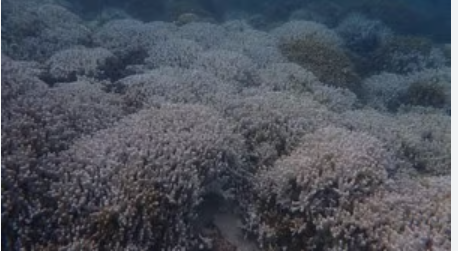Marine Heatwaves Trigger Widespread Coral Bleaching in Lakshadweep Sea
Researchers at the Central Marine Fisheries Research Institute (CMFRI) reported widespread bleaching of coral reefs in the Lakshadweep Sea due to marine heatwaves.
Extensive surveys across Lakshadweep islands revealed a significant percentage of hard coral species undergoing serious bleaching due to prolonged marine heatwaves since late October 2023.
Marine heatwaves, considered rare extreme weather events, are extended periods of abnormal ocean temperatures exceeding the 90th percentile of regional ocean temperatures based on historical data. According to the National Oceanic and Atmospheric Administration (NOAA), such heat levels massively risk coral bleaching, endangering the region’s diverse marine ecosystems.
Senior scientist at CMFRI, K.R. Sreenath, warned of an unprecedented biodiversity crisis due to multispecies mortality if the situation escalates. Shelton Padua, another senior scientist at CMFRI, attributed the marine heatwaves primarily to excessive heat atmospheric transfer and shifts in ocean currents. Besides corals, these heatwaves also threaten other vital marine habitats like seagrass meadows.
The ecological damages can lead to local marine food web collapse, impacting numerous marine species. Dr. Sreenath emphasized that the marine heatwaves could cause substantial economic losses by disrupting ecosystem services essential to livelihoods, tourism, and fisheries.
About Central Marine Fisheries Research Institute
The Central Marine Fisheries Research Institute (CMFRI) is a leading marine research institute located in Kochi. Established on February 3, 1947, it operates under the Indian Council of Agricultural Research (ICAR). CMFRI specializes in the management and conservation of marine fisheries resources, with research programs covering marine biodiversity, aquaculture, and fishery environment.
About coral bleaching
‘Coral bleaching’ is an environmental phenomenon wherein coral reefs lose their vibrant colors and turn white. This phenomenon typically occurs when corals are stressed due to changes in conditions such as temperature, light, or nutrients. The stress causes corals to expel the symbiotic algae living in their tissues, causing them to turn white, hence the term ‘bleaching’. Although bleached corals are not dead, they are at a higher risk of dying. This event is a major concern because it impacts marine biodiversity and ecosystems, given that coral reefs support a wide variety of sea life.
About marine heatwaves
‘Marine heatwaves’ are prolonged periods of unusually warm ocean temperatures above the normal seasonal variations. They are similar to heatwaves experienced on land, but occur in the ocean. These events can last for weeks to months and often lead to significant ecological and economic impacts. Marine heatwaves can cause coral bleaching, disrupt ocean food chains, harm marine life including fish, seabirds, and mammals, and impact human activities like fishing. They are becoming more frequent and intense, largely driven by human-induced climate change.
About Lakshadweep Sea
The Lakshadweep Sea is in the southeastern region of the Arabian Sea, near the western coast of India. It is named after the Lakshadweep Islands and is known for its rich marine biodiversity, picturesque beaches, and coral reefs. The Lakshadweep Sea region is a major fishing ground for Indian fishermen and supports numerous species of flora and fauna.
Month: Current Affairs - May, 2024
Category: Environment Current Affairs


